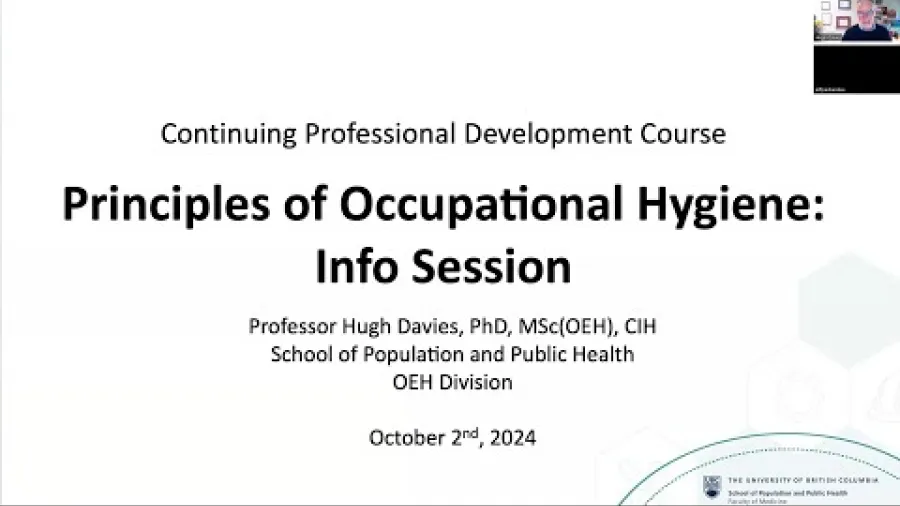Principles of Occupational Hygiene will help equip you with the ability to engage in effective workplace health and safety practices, whether you are new to the field or a seasoned professional looking to brush up on your knowledge. With the rapidly evolving field of occupational health and safety, there is a growing demand for professionals with occupational hygiene competencies to develop programs that integrate individual well-being, health and safety considerations. This course is suitable if you are a professional with occupational and environmental hygiene responsibilities without formal training. It is also a good fit if you are an early-stage occupational hygiene professional looking to enhance your skills, or an experienced professional looking to refresh your skills.
By the end of this course, you will be able to:
- understand the principles of occupational hygiene, enabling you to engage more effectively with workplace health and safety
- recognize the role of occupational hygiene professionals within an occupational health and safety team
- describe the regulatory frameworks governing occupational health and safety
- apply the occupational hygiene paradigm to solve occupational hygiene problems
- perform comprehensive hazard assessments
- design risk and exposure assessments
- develop the tools and knowledge necessary to collaborate effectively with health and safety personnel, such as joint health and safety committee members, the existing safety team or on-site consultants
- design effective exposure control plans and intervention programs
- conduct risk communication and plan for further education and certification
Course outline
The course will cover the following topics:
Introduction to Occupational Hygiene: Covers the basics, including getting started, the regulatory framework, the changing world of work, the occupational hygiene paradigm, and the steps to hazard management: anticipation, recognition, evaluation and control (and evaluation).
Anticipation and Recognition of Occupational Disease and its Causation: Topics include toxicology, occupational health hazards and occupational epidemiology.
Hazard Assessment: This section focuses on common industrial activities and processes and their associated hazards, occupational exposure limits and planning a workplace hazard and risk assessment.
Occupational Hygiene Evaluation: Foundations of workplace evaluations, surface sampling, measurement and working with analytical laboratories are discussed.
Measurement Methods: Learn about measuring gases and vapors, particulates and physical hazards such as noise, as well as analyzing and interpreting occupational hygiene exposure measurement data.
The Control Hierarchy: This module covers the control pyramid, engineering controls, administrative controls and personal protective equipment.
Occupational Hygiene Management: Topics include programming interventions, privacy, exposure control programs, health monitoring and evaluation, risk communication, ethics and integrating course elements.
How am I assessed?
Your assessment will include the following: individual assignments for each module that will earn you points upon completion, participation in online discussions and weekly one-hour online sessions, all of which will contribute to your overall evaluation.
Expected effort
The duration of the course is nine weeks, and the approximate time commitment expected for completing the course is 48 hours. Participants are expected to allocate approximately six hours per week to engage with course materials, which encompass lecture videos, podcasts, readings, real-world case-based assignments and a weekly one-hour online session.
Technology requirements
To take this course, and for the best experience, we recommend you have access to:
- an email account
- a computer or laptop using Windows or macOS or a tablet
- the latest version of a web browser (or previous major version release)
- a reliable internet connection.
For the weekly online sessions, you’ll also need:
- a video camera and microphone.
Course format
This course is 100% online and instructor supported. Course work is done independently and at your own pace within deadlines set by your instructor. Log in anytime to your course to access the lessons as they become available.
The course combines individual and group learning activities on the UBC Catalog learning platform with weekly one-hour online sessions facilitated by an instructor. Participants will have access to various resources, including lecture videos, podcasts, readings, real-world case-based assignments.

